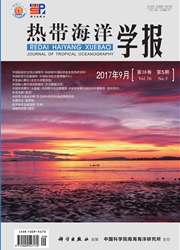

 中文摘要:
中文摘要:
对红河断裂带及其邻区219个地震的相关数据进行震源机制解分析,阐述了红河断裂带不同区段的地震分布特征及其地震类型的差异性.结合对研究区区域深部动力学条件的分析,从地震发生及其深部动力学特征分析红河断裂带活动的分段性特征,取得如下新认识:(1)红河断裂带北西段由于受印一藏碰撞影响而显现出挤压应力场特征,断裂活动具有逆断特征和局部拉张应力场下的正断特征;(2)中段作为华南亚板块与印支亚板块之间的主体剪切活动带,显现剪切应力场特征,断裂以剪切活动为主;(3)南东段在断裂带右旋走滑的基础上,受到深部物质抬升、岩石圈拉伸减薄的影响,而表现出张扭应力场性质,断裂活动显现张扭特征。
 英文摘要:
英文摘要:
Focal mechanism solutions of 219 earthquakes which happened in the Red River Fault Zone (RRFZ) and its adjacent areas were collected and analyzed. Based on these analyses, the distribution of earthquakes in different segments of the RRFZ and their difference in seismic types, as well as the regional deep dynamics condition were discussed. The characteristics of the RRFZ activity in different segments were concluded as follows. (1) The northwestern segment of the RRFZ shows a characteristic of a compressional stress field as a result of the India-Tibet collision, and the fault activity is characterized by thrusting with local extension; (2) As a primary shear zone between the Indochina Plate and the South China Plate, the middle segment of the RRFZ displays a characteristic of a shear stress field, and the fault activity is characterized by strike-slip; (3) Besides dextral slip, lithosphere in the southeast segment of the RRFZ experienced extension and thinning due to the upwelling of deep material, which resulted in the dextral transtensional stress field and tense-shearing fault activity in this section.
 同期刊论文项目
同期刊论文项目
 同项目期刊论文
同项目期刊论文
 期刊信息
期刊信息
